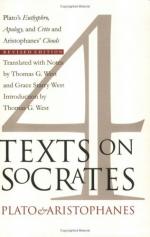
|
| Name: _________________________ | Period: ___________________ |
This quiz consists of 5 multiple choice and 5 short answer questions through Plato's Euthyphro.
Multiple Choice Questions
1. Why does Euthyphro decide to end his conversation with Socrates?
(a) Euthyphro was personally insulted after Socrates mentioned his father.
(b) He is frustrated at the logical traps Socrates has put him in.
(c) Euthyphro successfully argued his case, and emerged victorious.
(d) Socrates has become belligerent and angry.
2. What does Socrates believe is the central question of life?
(a) How should one live one's life?
(b) What is it all for?
(c) How does one acquire knowledge?
(d) What is the meaning of piety?
3. According to Socrates, what is dangerous about the conclusion that human good is related to what is dear to the gods?
(a) Human good is only separated from human evil by a hair.
(b) The gods may hate humans, making this conclusion suspect.
(c) Any conclusion about human good should include societal values.
(d) The gods are unknowable, making this conclusion merely speculative.
4. How many speeches did Socrates give in his defense during his trial in Athens?
(a) One.
(b) Two.
(c) Three.
(d) Zero.
5. According to Socrates in Euthyphro, why don't wise men need to consult with the gods?
(a) The gods are impossible to access, and the journey is too difficult.
(b) Wise men don't need to consult with gods, but they certainly should.
(c) The gods know too much; people need to find things out for themselves.
(d) The gods are not the final arbiters of what is good and truthful.
Short Answer Questions
1. Which god does Euthyphro admire above all others?
2. What topic does Socrates discuss to dismantle Euthyphro's initial definition of piety?
3. Who is Socrates' prosecutor in his trial?
4. What city does Euthyphro take place in?
5. What is the subject of Plato's Apology?
|
This section contains 292 words (approx. 1 page at 300 words per page) |

|




